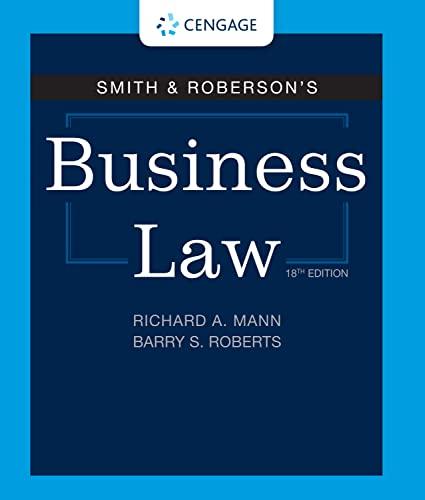Question
Case 11.3: Integrity Staffing Solutions v. Busk, 135 S. Ct. 513 (2014) (p. 373) Facts: Integrity Staffing Solutions, Inc. (Integrity) provides warehouse staffing to Amazon
Case 11.3: Integrity Staffing Solutions v. Busk, 135 S. Ct. 513 (2014) (p. 373)
Facts: Integrity Staffing Solutions, Inc. (Integrity) provides warehouse staffing to Amazon throughout the United States. Jesse Busk (Busk) worked as an hourly employee of Integrity at warehouses in Nevada. As a warehouse employee, Busk retrieved products from the shelves and packaged those products for delivery to Amazon customers. Integrity required its employees to undergo a security screening before leaving the warehouse at the end of each day. In 2010, Busk and another employee filed suit against Integrity for alleged violations of the FLSA and Nevada labor laws, alleging that they were entitled to compensation under the FLSA for time spent waiting to undergo and actually undergoing the security screenings. They alleged that such time amounted to roughly 25 minutes each day and the screenings were conducted to prevent employee theft and thus occurred solely for the benefit of the employers and their customers. The trial court ruled in favor of Integrity, but the Court of Appeals reversed. The Court of Appeals held that the screenings were compensable as they were required by the employer, necessary to the employees' primary work as warehouse employees, and done for Integrity benefit. Integrity appealed.
Issue: Were the security screenings "integral and indispensable" to the employee's duties in the warehouse?
Reasoning: No. The screenings were not an integral part of retrieving products from the warehouse shelves or packaging them for shipment, so they are exempt from the workweek under the Portal to Portal Act.
Case questions: 1. The employees in this case pointed to the fact that Integrity could have greatly reduced the amount of time for screening to just a few minutes by employing more personnel and metal detectors. Should the Court have given more weight to that fact? 2. What did the Court identify as the error made by the Court of Appeals? Why was that important?
True/False
1. Busk is considered an exempt employee under FLSA, based on the educational requirements for his job, the amount of physical labor required, the repetitive nature of the job's tasks, and the supervision required.
2. Busk's employment is governed by the employment-at-will doctrine.
3. Busk is compensated on an hourly basis, and is entitled to overtime pay at a rate of 1.5 times his hourly rate for any hours he works beyond 40 hours in a 7-day week.
4. ERISA requires Busk's employer to provide him with a pension or defined contribution retirement plan.
5. Busk's employer is likely exempt from the Occupational Safety and Health Administration Act (OSHA).
Step by Step Solution
There are 3 Steps involved in it
Step: 1

Get Instant Access to Expert-Tailored Solutions
See step-by-step solutions with expert insights and AI powered tools for academic success
Step: 2

Step: 3

Ace Your Homework with AI
Get the answers you need in no time with our AI-driven, step-by-step assistance
Get Started


